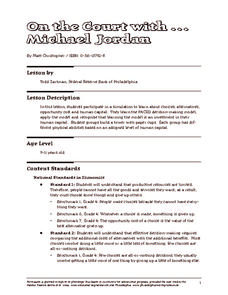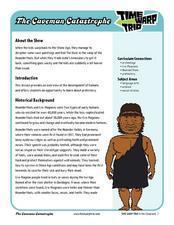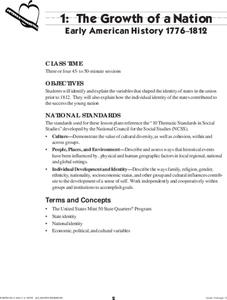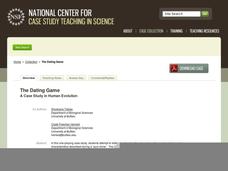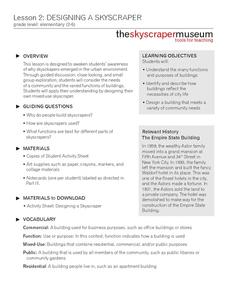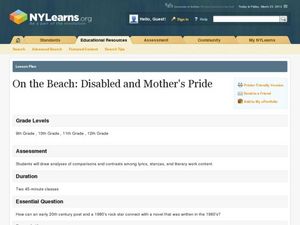Howard Hughes Medical Institute
Human Feet Are Strange
Feet are neat! So, if you've already walked the path of examining animal footprints with your class, put them in the shoes of early humans! A well-designed activity incorporates video, discussion, and hands-on learning to demonstrate how...
Council for Economic Education
Out of Africa: Why Early Humans Settled around the World
Why would someone want to leave home? The age-old question is at the center of a thought-provoking activity. Scholars consider why humans move around the world both during pre-historical times and today using a PowerPoint, reading on...
Curated OER
Human Rights And Civil Rights
While he may not be as well known as civil rights activists such as Mahatma Gandhi, Dr. Martin Luther King, or Malcolm X, Ralph Bunche's contributions certainly made him a leader in the struggle for civil rights in the United States and...
Curated OER
Child Nutrition Unit
How much fun can you have teaching adolescents about nutrition? Try taking them to work with preschoolers for an hour! This 4-day mini-unit about the importance of nutrition early in life culminates with a field trip. It was written for...
New York City Department of Education
Geography and Early Peoples of the Western Hemisphere
Young historians discover the early people of the western hemisphere. The unit explores how the land changed, how it was used and homes of early Americans such as Incas, Mayans, Inuits, Aztecs, and Pueblos. Individuals also examine these...
Florida Department of Environmental Protection
Water's Journey Expedition
Step into a scientist's shoes to go online and discover the Florida Springs Expedition, and participate in two activities focusing on how humans impact the environment. The first activity asks scholars to summarize the six dispatches at...
Federal Reserve Bank
On the Court with... Michael Jordan
Pupils learn foundational economic concepts and consider the importance of decision-making, how to evaluate choices and alternatives, and the benefits of consistent training and practice by learning about the early life of Michael Jordan.
Council for Economic Education
Wages and the Black Death
While the Black Death wiped out a third of Europe's population during the Middle Ages, its destruction paved the way for better wages for workers and even an early form of modern capitalism. The relationship between the cataclysmic event...
Time Warp Trio
The Caveman Catastrophe
Young archaeologists study the development of human history, and work in groups to create a timeline that traces the development of humans. Additionally, the groups utilize a very clever graphic organizer embedded in the plan in order to...
Curated OER
The Chesapeake Bay in Captain John Smith's Time
When Captain John Smith visited the Chesapeake Bay in the summer of 1608, what types of animals and habitats did he encounter? Your young historians will analyze primary source documents to answer this question, as well as compare the...
Curated OER
The True Confessions of Charlotte Doyle: KWHL
After completing the 11th chapter of The True Confessions of Charlotte Doyle by Avi, take part in a KWHL chart driven by the question,When is it appropriate and admirable to defy authority? Focusing on codes of conduct, scholars...
Curated OER
Turning the Tide on Trash: Marine Debris Curriculum
Seven pages of fascinating reading on marine debris preface the activities in this lesson plan. Four different activities are employed to simulate how the debris is distributed in the ocean and along beaches. Early ecology learners...
National Endowment for the Humanities
NAACP’s Anti-Lynching Campaign in the 1920s
Young scholars investigate the anti-lynching campaign of the NAACP in the 1920's. In this human rights instructional activity, students prepare for and participate in a simulated debate of the Dyer Anti-Lynching Bill that was presented...
Curated OER
Mexican Culture “La Raspa”
Here are three lessons that work together to engage learners in a cultural and musical exploration. In lesson one the listen to the Mexican folk song, "La Raspa" and discuss cultural context. In lesson two they dance along to both "La...
BrainPOP
Coping with Bullying Lesson Plan: Strategies for Real-Life Situations
Offer young scholars strategies for dealing with bullies with help from BrainPop Jr.'s favorite characters, Annie and Moby. Youngsters watch a video, take part in a grand conversation, and play a game designed to reinforce coping skills...
US Mint
The Growth of a Nation
Young historians explore the identity of the early United States in this four-part instructional activity series. Working in groups of three, students research the political, economic, and cultural atmosphere of each member of the...
National Endowment for the Humanities
Slavery and the American Founding: The "Inconsistency Not to Be Excused"
High schoolers examine slavery in the revolutionary and colonial eras of the United States. In this slavery lesson, students investigate the presence of slavery in early America, the language of the Constitution, and the intent of the...
National Center for Case Study Teaching in Science
The Dating Game
Learn about the human's ancestors through the (carbon) Dating Game. Use the script to have your high schoolers act out one round of the game. Once they have the idea, they will research another human ancestor and play a second round the...
Agriculture in the Classroom
A Rafter of Turkeys
How did that turkey get from the early Aztec culture to your table? Learn about the history of wild and domesticated turkeys in North America, as well as their inclusion in Thanksgiving traditions, with a two-part agricultural science...
Curated OER
Collecting Data to Learn About the People Around You
Human graphs, anyone? Did you eat fruit today? What is your favorite costume? Have your K – 6 learners graph the responses. Early elementary grades may count and compare while upper grades compare responses of different groups or make...
National Endowment for the Humanities
Tales of the Supernatural
Scary stuff! Whether approached as the first horror story or a "serious imaginative exploration of the human condition," Frankenstein continues to engage readers. Here's a packet of activities that uses Mary Shelley's gothic novel to...
Skyscraper Museum
Designing a Skyscraper
Besides serving as awe-inspiring monuments of human achievement, skyscrapers are built to perform a wide range of functions in urban communities. The second lesson plan in this series begins by exploring the history of the Empire State...
Curated OER
On the Beach: Disabled and Mother's Pride
What do an early 20th century poet and a 1980's rock star have in common with a novel from the 1960's? Using Wilfred Owen's poem "Disabled" and George Michael's song "Mother's Pride," learners answer questions about the lyrics and themes...
Mr. Roughton
Pawn Stars: Africa
What element was worth more during the growth of empires in West Africa: gold or halite? After examining various pieces of evidence of primary and secondary source documents placed around the room, your class members will each make a...








